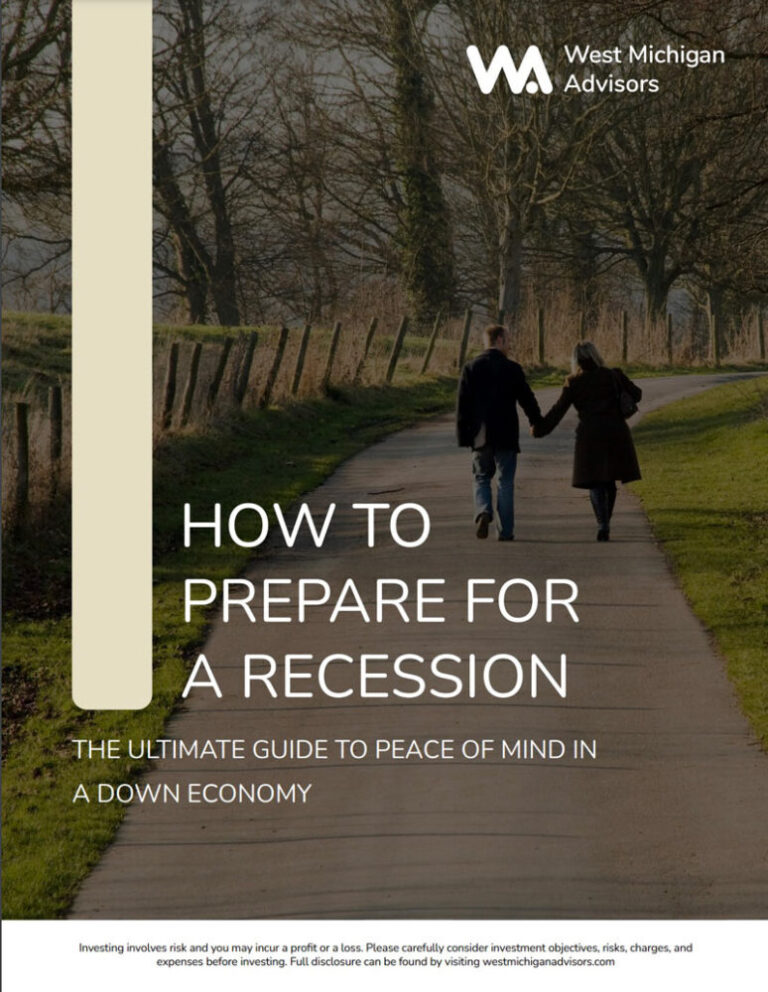Few people ever feel “ready” to talk about estate planning. The topic just seems too big. They’re not sure where to start or even what questions to ask. Even when they have a meeting with their financial advisor on the calendar, they just feel unsettled.
At West Michigan Advisors, we know the process can be a lot to manage. So it’s okay if you’re feeling a little uneasy. But it’s also true that this process is important. A great estate plan can build and protect your legacy. It can be a tool to bless your family for generations to come. That’s why we want to help get you started on the right foot.
In this article, we’ll show you how to prepare for an estate planning meeting. These tips will help you gather your thoughts (and the right materials) ahead of your appointment. That way, you’ll be ready to make the most of your time with your financial advisor.
What is Estate Planning?
If you have a meeting scheduled, chances are you already have an idea of what estate planning is. But as you prepare for your meeting, we find it helpful to consider these reminders:
Estate planning is a plan for your assets
At its most basic level, this process is about deciding how your assets will be managed if something happens to you. That way your hard work doesn’t go to waste, but can be passed on to others. As part of your plan you may decide how your assets are divided amongst family members or are donated to charities or nonprofit organizations.
Estate planning is a tremendous act of love
Creating a plan for your assets might sound cold or even morbid. But in reality, estate planning is one of the most loving things you can do for your friends and family. Without an estate plan, the burden falls to them. They would have to sort through funeral plans and asset distributions, all in the middle of the grieving process. That can cause enormous stress or even division among your loved ones.
Preparing ahead of time gives your family the clarity and direction they need in such a difficult time. They’ll be able to come together and follow through on decisions that will be good for years to come.
Estate planning is a dynamic process
The one constant in life is change. Your priorities, assets, and circumstances will change throughout the years and your estate plan needs to change as you do. That means even if this is your first conversation about estate planning, it won’t be your last. You’ll stay in dialogue with your financial advisor and attorney to make sure everything is up to date. So don’t worry about covering everything in one meeting — there will be many helpful conversations to follow.
How to Prepare for an Estate Planning Meeting
With those reminders in mind, it’s time to begin preparing for your estate planning meeting. These 4 steps will help you get ready to sit down with your advisor.

1. Review What You’ve Done So Far
This may be your first estate planning meeting. Or, perhaps you’ve worked with a different financial advisor or professional in the past.
Either way, chances are you’re not starting from scratch.
If you’ve worked with a professional before, pull up those documents and look them over carefully. You may need to refresh your memory on what you had worked on before. Some decisions may have been made or important pieces of information may be included that you’ve forgotten about. Review these documents to know your starting place.
Even if this is your first time formally discussing your estate plan, you likely already have some pieces in place. Consider retirement accounts, life insurance policies, and assets like real estate and investments. If you can gather this information ahead of time, you’ll help your meeting get off to a great start. Your financial advisor will be able to understand where you’re coming from and can begin charting where you want to go.

2. Consider Your Legacy
As you review your work so far, it may bring up more than numbers. You’ll likely find yourself reflecting on the bigger picture. Chances are you’ll start considering your legacy.
This is a good impulse, lean into it.
Take some time to ask yourself the bigger questions. What has your life been about? What’s most important to you? What do you want to leave behind?
Let your answers guide everything you do from here on out. Your estate plan should be an extension of your life and legacy. Bring these ideas to your meeting and talk about them in as much detail as possible with your financial advisor. If you start by talking about your bigger goals, then your estate plan can be built around achieving them.
3. Determine Your Beneficiaries
The first two tips on this list of how to prepare for an estate planning meeting have helped you consider the “what” and the “why”. Now it’s important to consider the “who”.
Who are your beneficiaries? Who do you want to be part of your estate plan and in what capacity?
Many times these answers will be straightforward. You’ll want to list your spouse, children, and grandchildren. Just be sure that your list of beneficiaries is up to date if your family has expanded in recent years.
With each person, make note of any special considerations. Even if it’s not written up in a legal document (your attorney will help here), have some guidelines for each beneficiary. Do you want to include any stipulations, such as an age a beneficiary must reach before distribution?
As you make your list, consider other types of beneficiaries. Do you want to leave a portion of your assets to a nonprofit or charity? Any special endowments or funds you’d like to set up? Again, your financial advisor and attorney can help you think through these decisions, but to make the most of your meeting, gather some thoughts ahead of time.

4. Collaborate with an Estate Planning Attorney
In this article we’ve been sharing how to prepare for an estate planning meeting with a financial advisor. But remember that you’ll also need to work with an attorney.
A financial advisor can help you steward your assets and can manage them with a smart financial plan. But you’ll need to partner with an attorney to get everything written up in legal documents. The two professionals work together but have different functions.
As you get ready for your meeting, remember which professional you’re about to sit down with. If you have legal questions, make note of them, but also know that your financial advisor cannot be your primary counselor here. Instead, as you prepare, focus on the financial side of estate planning.
While it may sound confusing to have to work with multiple professionals, we actually find this is helpful. It allows people to approach estate planning in smaller chunks. Instead of taking it all at once, they can deal with the legal and financial sides in turn. That’s more manageable and it results in a better plan.
Make the Most of Your Estate Planning Meeting
If you’ve followed these steps, you can take a deep breath. You’re ready for a productive estate planning meeting.
If you’ve chosen a good financial advisor, the process gets easier from here. Share the work you’ve done so far and then let your advisor guide you to the next steps. They’ll know how to take your thoughts and build them into a strategy. Together you can create an estate plan that will care for your family for generations to come.
The material has been gathered from sources believed to be reliable, however West Michigan Advisors cannot guarantee the accuracy or completeness of such information, and certain information presented here may have been condensed or summarized from its original source. To determine which investments or planning strategies may be appropriate for you, consult your financial advisor or other industry professional prior to investing or implementing a planning strategy. This article is not intended to provide investment, tax or legal advice, and nothing contained in these materials should be taken as such. Investment Advisory services are offered through West Michigan Advisors. Advisory services are only offered where West Michigan Advisors and its representatives are properly licensed or exempt from licensure. No advice may be rendered unless a client agreement is in place.










